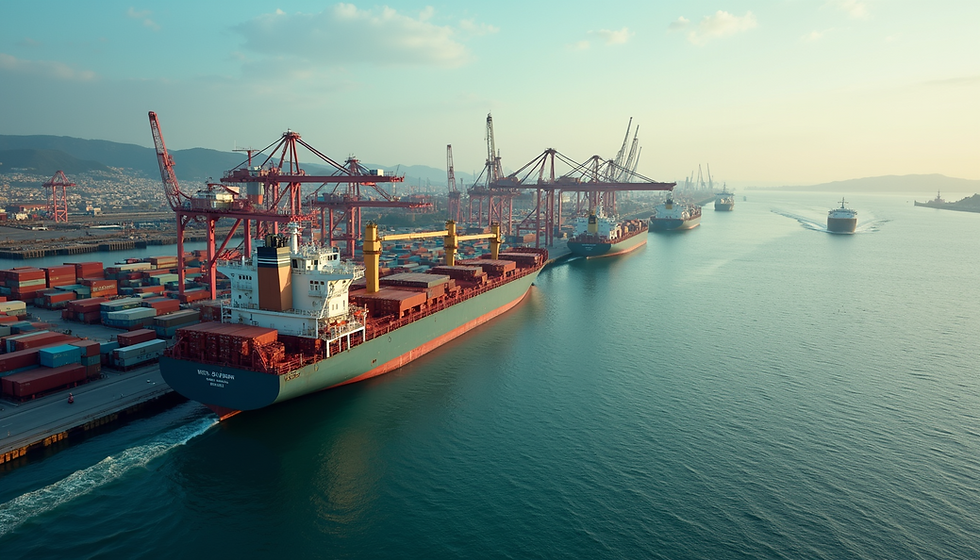Understanding the Basics of Freight Forwarding
- Mads Christiansen

- Jun 6, 2025
- 4 min read
What is Freight Forwarding?
At its core, freight forwarding is the service provided by companies or individuals who arrange the transportation of goods on behalf of others. These forwarders act as intermediaries between shippers and transportation services. Their primary goal is to facilitate the smooth and cost-effective movement of goods globally.
For example, a clothing retailer in the U.S. may source garments from manufacturers in India. The retailer doesn’t directly handle the logistics but hires a freight forwarder to manage all shipping arrangements. This can include negotiating rates with carriers, preparing necessary documentation, and coordinating the movement of goods.

The Freight Forwarding Process
Understanding the steps involved in freight forwarding can help businesses grasp how their goods reach global customers. Here’s a breakdown:
Booking the Cargo: The process starts with the shipper requesting a quote from a freight forwarder. The forwarder assesses the details and provides an estimate.
Documentation: Once booked, the forwarder prepares various documents like bills of lading, commercial invoices, and export declarations. These are essential for customs clearance.
Transporting the Goods: The forwarder coordinates the mode of transport—whether by air, sea, or land. They choose a method based on factors like cost, speed, and the nature of the goods.
Customs Clearance: This is a critical step in the process. The freight forwarder ensures that all customs regulations are met, avoiding delays and additional charges. They help in submitting the necessary paperwork to the authorities.
Final Delivery: Once the cargo reaches its destination, the forwarder confirms that the goods are delivered to the final location. This may involve local transportation and unloading services.
This structured approach ensures that the shipping process is seamless, efficient, and less stressful for the shipper.

Key Terminology in Freight Forwarding
Understanding key terms is essential when navigating the freight forwarding landscape. Here are some foundational terms that greatly impact logistics operations:
Bill of Lading (BOL): A legal document between a shipper and carrier that outlines the details of the cargo and serves as a receipt for shipment.
Freight Forwarder: An entity that handles logistics and shipping of goods, acting as an intermediary between the shipper and various transportation services.
Incoterms: Short for International Commercial Terms, these define the responsibilities of both the buyer and seller in international trade, including who pays for shipping and insurance.
Customs Duties: Government taxes imposed on imported and exported goods. Understanding this helps businesses gauge the total cost of shipping.
Air Waybill: A document used in air freight that acts as a receipt and contract between the shipper and the airline.
Familiarizing yourself with these terminologies can reduce misunderstandings and streamline the shipping process, making it more efficient.
Benefits of Using Freight Forwarders
Using freight forwarding services offers several benefits to businesses. Here’s why companies choose to work with freight forwarders:
Expertise and Experience: Freight forwarders often have extensive knowledge about shipping regulations and procedures, which can save businesses time and headaches.
Cost-Effective Solutions: Many forwarders have established relationships with carriers, allowing them to negotiate better rates on behalf of the shipper.
Time-Saving: With a freight forwarder, businesses can focus on their core operations while the forwarder manages all logistics.
Risk Management: Freight forwarders assess potential risks and advise clients on how to mitigate them, such as ensuring proper cargo insurance.
Enhanced Network: With a robust network of contacts in various ports and airports, freight forwarders can expedite processes that would otherwise take longer for a shipper to manage alone.
By relying on freight forwarders, businesses can navigate complex international logistics with ease and success.

Partnering with a Freight Forwarder
Choosing the right freight forwarder is essential for businesses looking to expand their global reach. Here are some suggestions to consider when selecting a forwarder:
Reputation: Research the forwarder's reputation. Look for reviews, testimonials, and case studies.
Experience: Ensure the forwarder has experience in handling goods similar to yours and operating in the markets you serve.
Range of Services: Consider whether the forwarder offers additional services such as warehousing, customs clearance, and cargo insurance.
Communication: Choose a forwarder who provides clear lines of communication and is responsive to inquiries.
Technological Capability: A tech-savvy forwarder can offer tools for tracking shipments and managing logistics online.
By taking these factors into account, businesses can ensure they partner with a freight forwarder that meets their specific needs.
Final Thoughts on Freight Forwarding
Understanding the basics of freight forwarding is invaluable for any business involved in international trade. From the initial booking to final delivery, a good freight forwarder enhances efficiency, reduces costs, and simplifies operations. For those seeking comprehensive solutions for their logistics needs, exploring options in freight forwarding logistics is a great start.
By being well-informed about the process and terminology, businesses can optimize their
shipping strategies and ultimately achieve greater success in global markets. Recognizing the importance of a dependable freight forwarder can make all the difference in driving growth and innovation in your operations.




.png)